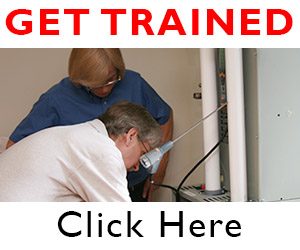Truly having a heart-to-heart discussion on where they saw themselves now and into the future is the key. It tells them and us what’s important, and what needs to change.
For some, it has nothing to do with money. It’s about time off, or what certifications they want to pursue, or the jobs they want to work on. The raises are secondary.
For others, it IS all about the money. The only way to understand where they are is to sit down with them and discuss it candidly.
This was a huge turning point for our company.
Walsh: We have tech levels and each one has it’s own set criteria that our technicians must achieve to advance. There are very specific guidelines they have to meet. This includes certain NATE certifications, NCI certifications, specific skills for specific equipment, and so on. As they accomplish these criteria, they can move from one level to the next.
Within each level, there are metrics to show how they are doing with regard to company policy. Are they doing check-ins? Are they generating good reviews? Are they meeting revenue goals? How are they doing on their billing efficiency? Are they billing out their time appropriately?
We look at all these things and others like how well they take care of their truck, how they show up to work each day, and so on. These are within each tech level. This helps determine their pay at that level.
PROMOTION AND MARKETING
No business can achieve its potential without getting the word out. It is
important not only to promote services and products that are key
differentiators, but also to promote the type of business you run
so as toattract potential employees as well.
Q: Drew Cameron, president, HVAC Sellutions, Inc., Pocopson, PA: What are members of the panel doing to market your companies? Please talk about how you market ‘ whether you use podcasts, direct mail, radio/TV advertising, and/or website ads. Do you also educate customers as to what your services are to create more opportunities?
A: McKeraghan: I have an ‘Ask the Expert’ column in our local newspaper and I write articles for several magazines. The idea is for our company to become the local experts. Even when the reporters are doing their own stories, they sometimes call me because I am considered the expert.
We’ve also updated our website and we’ve gone back to using Online Access (www.hvacwebsites.com) where we have a nice section in there that explains Performance-Based Contracting and what we’ve done.
This past year we won our local Chamber of Commerce’s Small Contractor of the Year award. That gave us a tremendous amount of visibility and credibility in our marketing area.
We haven’t done any Yellow Pages advertising in the past 12 years. In fact, we’ve stopped much of the advertising we’ve done. We track where our leads come from and found we didn’t get good leads for the money we spent.
We’re looking at doing a lot more direct mail via our email system. However, the laws in Ontario have recently changed regarding emailing clients and we’ll have to figure out how we go forward with those campaigns.
Montes: Something I learned through an EGIA class is it’s more important to focus on the customers you have versus those you don’t. Existing customers represent a constant revenue stream. They are loyal to you.
To reach them, we send out a professional newsletter. We’ve been doing this for years. We used the newsletter as an educational piece to talk to our current customer base. They already trust us. They are predisposed to do business with us again. We also use the newsletter to educate them on airflow and more.
 Ball: We have two direct mail pieces and do a 4,000 person mailer per week for our maintenance tune-up discount for non-agreement customers. We receive a decent response to that because it is personally addressed to the homeowner. We get a much better response than we do with postcards and such.
Ball: We have two direct mail pieces and do a 4,000 person mailer per week for our maintenance tune-up discount for non-agreement customers. We receive a decent response to that because it is personally addressed to the homeowner. We get a much better response than we do with postcards and such.
The other thing we do is build profiles of a customer’s HVAC system, especially if their equipment is more than 10 years old. In those cases, we send them a letter discussing the lifespan of their equipment, its age now, and why they should begin thinking about replacing it.
Our service manager also makes quality check calls on those systems older than 20 years. He tells customers he is there as part of our quality control process ‘ to make sure our guys provide everything the customer needs.
This has been a really good system for us. The service manager can close replacement sales 90% of the time on those types of calls.
CONCLUSION
All the panelists agreed on one final thought — and that is the importance of association membership. They describe this as a peer-to-peer network where you can learn from others who have traveled the road before you.
Jim Ball summarized this up nicely. He said, ‘I know it can be difficult to participate in an association at first. But the truth is, what you get out of your membership is equal to what you put in.
‘As Stephen Covey says,’ Jim continues, ‘You must continuously sharpen your saw. When you go back to work after an association conference ends, your saw will get dull. You’ll keep trying to cut through the grind of the daily existence. So you have to keep coming back to those programs and meetings to sharpen the blade again.
‘If you don’t, you simply won’t grow. Here at this Summit meeting, there is no one who can say they’ve attended every event and haven’t grown as a leader, as a company, and as a professional who can work with both their employees and their customers.’
So take a chance. Participation is important. It is fundamental to your growth and success.












Recent Comments